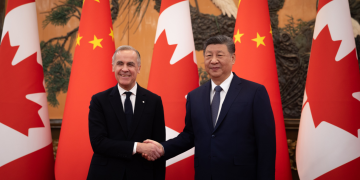China has achieved a significant milestone in its economic landscape, with its annual trade in services exceeding 1 trillion U.S. dollars for the first time last year. The latest data from the Ministry of Commerce (MOC) reveals that the total value of services imports and exports reached a record 7.5 trillion yuan (approximately 1.05 trillion U.S. dollars) in 2024, reflecting a robust 14.4 percent year-on-year growth.
According to the MOC, exports surged by 18.2 percent, while imports rose by 11.8 percent. This growth trajectory has been largely driven by global trends such as digitization, advancements in smart technology, and a push for green development. Li Jun, a researcher at the Chinese Academy of International Trade and Economic Cooperation, emphasized that these factors have not only expanded the scale of China’s services trade but also optimized its structure and enhanced its international competitiveness.
Li highlighted the impact of China’s relaxed visa-free transit policy, which has significantly boosted inbound tourism. This policy has led to the emergence of the popular hashtag “China Travel” on social media, where travelers share their experiences exploring the country’s rich cultural landmarks, natural beauty, and vibrant city life.
“’China Travel’ is booming rapidly, and this growth is expected to further enhance the country’s services trade while aiding the global travel industry’s recovery,” Li stated.
China’s digital cultural platforms are gaining traction internationally, with notable examples including the popular video game “Black Myth: Wukong” and the distribution of high-quality Chinese films and TV dramas on platforms like Netflix and YouTube. Additionally, Chinese internet literature is increasingly captivating international readers.
In August 2024, the Chinese government released a guideline aimed at promoting the high-quality development of trade in services through enhanced opening-up policies. This document underscores the need for continuous improvement in institutional openness and the gradual shortening of the negative list for cross-border trade in services.
Li urged the swift establishment of national demonstration zones for innovative service trade development and called for unlocking the potential of industrial digitization and digital transformation. He also emphasized the importance of supporting professional organizations in finance, consulting, design, and certification to bolster their international service capabilities.
Looking ahead, Li suggested expanding bilateral, multilateral, and regional collaborations in digital trade and services. He recommended leveraging major exhibition platforms and developing international services trade cooperation parks to facilitate this growth.
As China continues to navigate the evolving landscape of global trade, its burgeoning services sector presents a promising avenue for economic expansion and international cooperation.
China has achieved a significant milestone in its economic landscape, with its annual trade in services exceeding 1 trillion U.S. dollars for the first time last year. The latest data from the Ministry of Commerce (MOC) reveals that the total value of services imports and exports reached a record 7.5 trillion yuan (approximately 1.05 trillion U.S. dollars) in 2024, reflecting a robust 14.4 percent year-on-year growth.
According to the MOC, exports surged by 18.2 percent, while imports rose by 11.8 percent. This growth trajectory has been largely driven by global trends such as digitization, advancements in smart technology, and a push for green development. Li Jun, a researcher at the Chinese Academy of International Trade and Economic Cooperation, emphasized that these factors have not only expanded the scale of China’s services trade but also optimized its structure and enhanced its international competitiveness.
Li highlighted the impact of China’s relaxed visa-free transit policy, which has significantly boosted inbound tourism. This policy has led to the emergence of the popular hashtag “China Travel” on social media, where travelers share their experiences exploring the country’s rich cultural landmarks, natural beauty, and vibrant city life.
“’China Travel’ is booming rapidly, and this growth is expected to further enhance the country’s services trade while aiding the global travel industry’s recovery,” Li stated.
China’s digital cultural platforms are gaining traction internationally, with notable examples including the popular video game “Black Myth: Wukong” and the distribution of high-quality Chinese films and TV dramas on platforms like Netflix and YouTube. Additionally, Chinese internet literature is increasingly captivating international readers.
In August 2024, the Chinese government released a guideline aimed at promoting the high-quality development of trade in services through enhanced opening-up policies. This document underscores the need for continuous improvement in institutional openness and the gradual shortening of the negative list for cross-border trade in services.
Li urged the swift establishment of national demonstration zones for innovative service trade development and called for unlocking the potential of industrial digitization and digital transformation. He also emphasized the importance of supporting professional organizations in finance, consulting, design, and certification to bolster their international service capabilities.
Looking ahead, Li suggested expanding bilateral, multilateral, and regional collaborations in digital trade and services. He recommended leveraging major exhibition platforms and developing international services trade cooperation parks to facilitate this growth.
As China continues to navigate the evolving landscape of global trade, its burgeoning services sector presents a promising avenue for economic expansion and international cooperation.













































